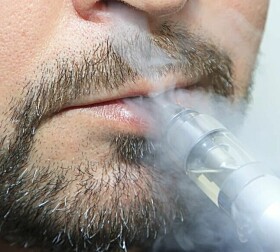
Study shows link between the tobacco product snus and cancer – researcher points out that the numbers are small
A new study shows that there is a link between snus and deadly cancer. However, Norwegian Institute of Public Health (NIPH) researcher Tord Vedøy points out that the numbers are small.
The risk of oesophageal cancer is more than three times higher, and the risk of pancreatic cancer is twice as high in snus users than in others, according to a new study reported by NRK recently (link in Norwegian).
Snus
is a powdered tobacco, which today usually comes in a small pouch which is stuffed
under the upper lip.
The study reveals that only for these two types of cancer do researchers have more than low confidence in what the numbers show. The risk of oesophageal cancer triples from 0.016 per cent to 0.055 per cent, and the risk of pancreatic cancer doubles from 0.072 to 0.15 per cent.
Vedøy emphasises that we are talking about small numbers. Whether the increase is significant or not depends on the strictness of the criteria set, as the margin of error can be large with such small numbers.
“It has to do with how strict one is with statistical correlation. If one were a little stricter, many of the correlations would have disappeared,” Tord Vedøy, a senior researcher at the Norwegian Institute of Public Health (NIPH), tells NTB.
“Higher and higher mortality”
The study was conducted by the NIPH, the Cancer Registry of Norway, and the National Institute of Occupational Health. They have reviewed previous snus studies and looked at 15 of them.
"What we see in the studies that we have is that these occurrences of cancer follow the digestive tract," physician and researcher Bendik Brinchmann tells NRK.
"What we also see again and again is that the mortality of the cancer, if you get it and use snus, becomes higher," he adds.
Even for deadly cancer, the numbers are small. The risk increases from 2.14 per cent to 2.39 per cent for snus users.
“Best not to use snus”
NIPH researcher Tord Vedøy says the snus report uses old numbers and that the numbers are small. But it's best not to use snus, he says.
“It's a perfectly fine study, and there are many such studies being conducted. They show much of the same thing because it's the same underlying group you're looking at again. It becomes a bit indirect, and I don't think one should attach too much importance to the number itself,” he says.
Vedøy says there are two camps in the research on nicotine and tobacco products. Those who believe you shouldn't use anything, and those who believe you should look at which tobacco products carry the least risk.
“The best thing is not to use snus, and then we have the debate about whether, if you smoke and can’t quit, it may be better that you use snus,” he says.
Most viewed
A big puzzle
He adds that for some it may be difficult to quit, while others may have personal reasons for wanting to use tobacco products.
“It is part of a large public health puzzle,” Vedøy says.
Many have called for more new snus research. In the studies that have been looked at in the new review, it is largely a group of Swedes from the 1980s that forms the basis for the numbers. Vedøy says that he believes it is, among other things, a problem that the snus that is on the market now is not the same as it was on the market then.
Snus manufacturer Skruf says they do not wish to comment on the findings in the study so far.
More young people use snus
The proportion of young people using snus has increased dramatically in recent decades. Especially the proportion of young women.
“In 2005, one per cent of young Norwegian women reported that they used snus. Now the proportion is up to 20 per cent,” Brinchmann says.
He believes it is particularly important that women aged 25 to 34, who are the ones who use snus the most, are aware of the risks of using snus when they are pregnant.
“As for pregnancy, we are very convinced that nicotine is problematic for the fetus,” says the researcher.
———
Translated by Alette Bjordal Gjellesvik.
Read the Norwegian version of this article on forskning.no





































